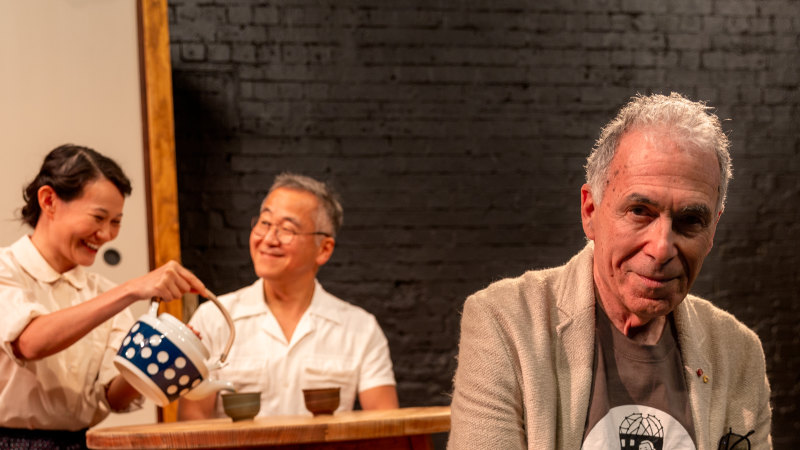Save articles for later
Add articles to your saved list and come back to them any time.
Actor Mayu Iwasaki first saw The Face of Jizo when she was just 12 and living in Tokyo.
“I watched the play, and it made me really want to be an actor,” she says. “That was my dream role.”
Now, more than two decades later, she is finally getting the chance to play Mitsue in the Australian premiere of Hisashi Inoue’s tender and funny story of a father and daughter, set against the background of the dropping of the atomic bomb on Hiroshima in 1945.
Roger Pulvers (foreground) with Mayu Iwasaki and Shingo Usami on the set of The Face of Jizo.Credit: Edwina Pickles
“At the time I didn’t think about the message for peace, just this beautiful Japanese story about a father and daughter,” she says.
“But now it’s more relevant than ever, with its setting in the aftermath of the war and talking about what happened under the mushroom cloud. And it’s focusing on the Japanese perspective of the war. And I think it’s an important message to share.”
The action in the play takes place three years after the bomb fell. Mitsue has not seen her father for years, but one day returns home from her work as a librarian to find he has returned – in spirit form. His mission is to help her let go of the past, overcome her survivor guilt, and consider herself worthy of happiness.
The two-hander, which first premiered in Tokyo in 1994, has been translated by Sydneysider Roger Pulvers, who was a lifelong friend to Inoue until his death aged 75 eight years ago. Pulvers believes The Face of Jizo is post-war Japan’s most important play, and for decades has wanted to bring it to Australia.
Mayu Iwasaki and Shingo Usami in a scene from The Face of Jizo.Credit: Phil Erbacher
“I was with him on the opening night in 1994,” he says. “I was so moved… I thought I wanted to translate it and I wanted it to have a production here in Australia. And 29 years later, here we are.”
For Pulvers it remains a curiosity that Australia, with its great affection for all things Japanese, has relatively little understanding of, or interest, in contemporary Japanese theatre.
“The contemporary theatre culture of Japan has not made inroads into Australia,” he says.
“When it comes to theatre, there’s been a barrier, and perhaps this sort of breaks through that bamboo ceiling, as it were, and introduces Australian audiences to the richness of the Japanese theatre narrative.
“I’ll put myself on the limits and say I think this is the first fully professional production of a post-war Japanese play in Australia.”
Veteran TV and film actor Shingo Usami, who plays Mitsue’s father, says he is pleased to be able to go beyond the stereotype of many of his other roles.
“I’ve been a Japanese actor in Australia for 25 years or so, and I have done so many war films or TV series, and, except for some exceptions, mostly it’s told really one-sided,” he says. “All the Japanese characters are so one dimensional – basically bad and cruel Japanese soldiers.”
“It’s been my personal endeavour to create some or find some Japanese character that has the human side, and then show the humanity.”
Pulvers believes one of the strengths of The Face of Jizo is its ability to go beyond the particularities of the father and daughter’s situation to consider timeless questions about war and suffering, which with the current conflicts in Europe, the Middle East and elsewhere are as relevant as ever.
“We should look beyond the context of this play and see that this is a play about the suffering of ordinary people during a conflict, and what could be more meaningful and significant than that message,” he says.
“When people see this play, I want them to empathise with the father and the daughter and to think this is like a father and the daughter in any country of the world. It’s about the human condition and human suffering. And that’s where the empathy, the very deep significant empathy, of this play resides.”
The Booklist is a weekly newsletter for book lovers from books editor Jason Steger. Get it delivered every Friday.
Most Viewed in Culture
From our partners
Source: Read Full Article



